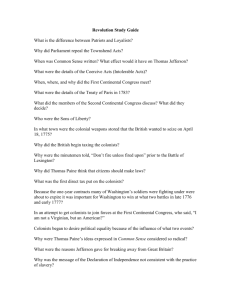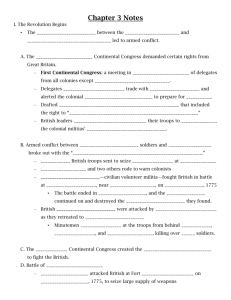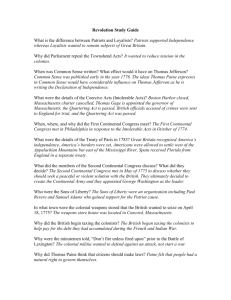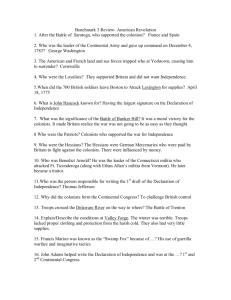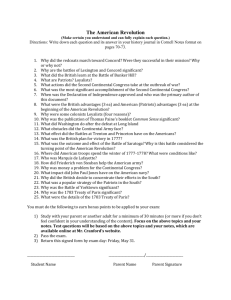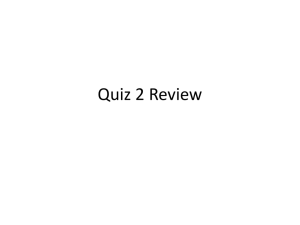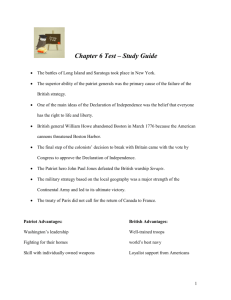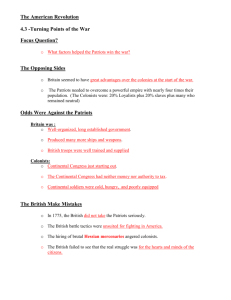Pre-Test American Revolution
advertisement
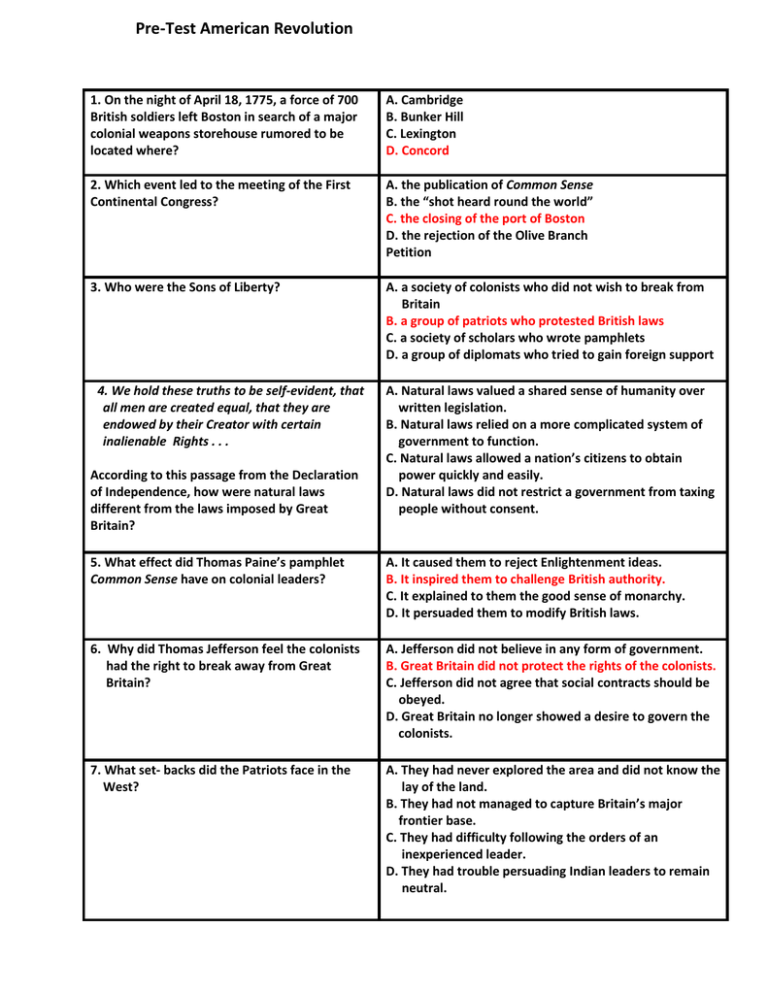
Pre-Test American Revolution 1. On the night of April 18, 1775, a force of 700 British soldiers left Boston in search of a major colonial weapons storehouse rumored to be located where? A. Cambridge B. Bunker Hill C. Lexington D. Concord 2. Which event led to the meeting of the First Continental Congress? A. the publication of Common Sense B. the “shot heard round the world” C. the closing of the port of Boston D. the rejection of the Olive Branch Petition 3. Who were the Sons of Liberty? A. a society of colonists who did not wish to break from Britain B. a group of patriots who protested British laws C. a society of scholars who wrote pamphlets D. a group of diplomats who tried to gain foreign support 14. We hold these truths to be self-evident, that all men are created equal, that they are endowed by their Creator with certain inalienable Rights . . . A. Natural laws valued a shared sense of humanity over written legislation. B. Natural laws relied on a more complicated system of government to function. C. Natural laws allowed a nation’s citizens to obtain power quickly and easily. D. Natural laws did not restrict a government from taxing people without consent. According to this passage from the Declaration of Independence, how were natural laws different from the laws imposed by Great Britain? 5. What effect did Thomas Paine’s pamphlet Common Sense have on colonial leaders? A. It caused them to reject Enlightenment ideas. B. It inspired them to challenge British authority. C. It explained to them the good sense of monarchy. D. It persuaded them to modify British laws. 6. Why did Thomas Jefferson feel the colonists had the right to break away from Great Britain? A. Jefferson did not believe in any form of government. B. Great Britain did not protect the rights of the colonists. C. Jefferson did not agree that social contracts should be obeyed. D. Great Britain no longer showed a desire to govern the colonists. 7. What set- backs did the Patriots face in the West? A. They had never explored the area and did not know the lay of the land. B. They had not managed to capture Britain’s major frontier base. C. They had difficulty following the orders of an inexperienced leader. D. They had trouble persuading Indian leaders to remain neutral. Pre-Test American Revolution 8. What is the likely reason that Spain became an ally to the Patriots? A. Spain wanted to gain control of the colonies. B. It appeared that the Patriots were losing the war. C. Spain wished to regain Florida from Britain. D. No other foreign nation believed in the Patriot cause. 9. When the Minutemen faced the British Redcoats at the start of the Battle of Lexington, why did their captain yell, “Don’t fire unless fired upon”? A. He wanted to hear the “shot heard round the world.” B. He wanted to defend against attack, not start a war. C. He wanted to reserve ammunition for future conflicts. D. He wanted to lure his enemies peaceably back to Boston. 10. Why was winning the battle in New Jersey so important to George Washington? A. The one-year contract many of his soldiers were fighting under was due to expire, and he knew soldiers would not reenlist in a losing army. B. The supply of cash Congress had given him was running low, and mercenaries from the German state of Hesse were threatening to flee. C. He had retreated across the Delaware into Pennsylvania, and if he didn’t come through with a victory his political career would be over. D. He had chosen a defensive approach to war, and the fact that he’d suffered severe losses as a result made him look like a poor leader. 11. Why did thousands of African American slaves sign on with the British Army? A. George Washington would not pay them for service to the revolutionary army. B. The British offered freedom to any slave who served in their army. C. British forces were better trained and equipped than American forces. D. British forces pledged to put an end to the institution of slavery in America. 12. Who was Bernardo de Gálvez? A. a Patriot ally who organized troops to attack British posts in the Southeast B. a Patriot foe who helped increase the British presence in Spanish Louisiana C. a Spanish nobleman who was inspired by the ideas of the American Revolution D. a Spanish defector who served in the British Army and was wounded in battle 13. Among colonists, which group made the greatest contribution to the war effort? A. soldiers B. mercenaries C. spies D militia men Pre-Test American Revolution 14. Who was nicknamed “the Swamp Fox,” and why? A. John Paul Jones, because his wiliness in capturing the British warship Serapis reminded his crew of a fox B. George Rogers Clark, because he led wet troops through the Wabash River to victory at the Battle of Vincennes C. George Washington, because his red hair shone like a fox’s coat as he led his men across the Delaware River D. Francis Marion, because of his stealth and lightning speed in carrying out guerrilla warfare in the South 15. The Battle of Trenton was different from previous battles because the Patriots A. emerged victorious. B. went on the offensive. C. took prisoners. D. fought at night. 16. Which of the following did not happen in reaction to the signing of the Declaration of Independence? A. More than 50,000 Loyalists fled the colonies as a result of conflicts with Patriots. B. Benjamin Franklin became separated from his Loyalist son William. C. The question of why slavery existed in a land where personal freedom was valued came up. D. Native Americans successfully stopped the colonists from expanding further west. 17. How did the Second Continental Congress decide to handle the British? A. They would create the Continental Army to fight the British. B. They would pay George Washington to negotiate with the British. C. They would mint a new currency to pay off the British. D. They would gather foreign allies to help attack the British. 18. What challenges did the Patriots face at sea? A. They had too few ships to fight large battles against the British. B. Their sailors were malnourished and many were sick. C. Their naval fleet was old and in disrepair. D. Their sailors were brave but had difficulty following orders. 19. Which of these groups was most divided in its support of the Patriots’ war effort? A. African Americans B. wealthy farmers C. American Indians D. women Pre-Test American Revolution 20. Before the battle in New Jersey, why did many Patriot leaders favor a defensive war? A. Their actions could then be justified. B. Their supplies would last longer. C. They could make a quicker retreat. D. They could exhaust the enemy sooner. 21. Who said, "I know not what course others may take; but as for me, give me liberty, or give me death!"? A. B. C. D. John Adams Patrick Henry Thomas Jefferson George Washington 22. Who was chosen by the Second Continental Congress to command the new Continental Army? A. B. C. D. John Adams William Howe Henry Knox George Washington 23. The British withdrew from Boston in 1776 after A. seeing cannons aimed down on them from nearby Dorchester Heights. B. hearing that the colonists had formed the Continental Army. C. clashing with colonial militias at Lexington and Concord. D. losing more than 1,000 men during the battle of Bunker Hill. 24. The purpose of the Olive Branch Petition was to persuade A. B. C. D. British troops to leave Boston. Parliament to repeal the Stamp Act. King George to make peace with the colonies. Volunteers to join the Continental Army. 25. The Declaration of Independence states that all people are born with certain rights that include the A. B. C. D. right to elect leaders who represent the people. rights to speak freely and to worship in peace. right to feel safe and secure in one's home. right to life, liberty, and the pursuit of happiness. 26. The day on which the Declaration of Independence was approved in 1776 is celebrated today as A. B. C. D. Thanksgiving Day. Independence Day. Memorial Day. Veterans Day. 27. The American victory at the Battle of Saratoga was a turning point in the Revolutionary War because it... A. B. C. D. forced the British to leave Canada. brought France into the war as an American ally. ended General Burgoyne’s career. liberated Georgia from British control.
